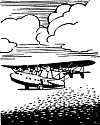|
Both the helicopter and airplane furnished valuable scientific information but he had to choose now which one he would develop; and as the airplane seemed to offer greater possibilities at the time, he discontinued his helicopter experiments.  Sikorsky built a second airplane, adding more power, and on June 3,
1910 made his first successful flight. His practice was bearing fruit.
New models followed - each larger and more powerful, until in
1913, he was ready to fly his latest - a four-engined ship
weighing 9000 pounds called the "Grand."
Sikorsky built a second airplane, adding more power, and on June 3,
1910 made his first successful flight. His practice was bearing fruit.
New models followed - each larger and more powerful, until in
1913, he was ready to fly his latest - a four-engined ship
weighing 9000 pounds called the "Grand." Before the flight, some said that the plane was too heavy to rise from the ground. Others were sure that the plane was too large to be controlled. But regardless of these warnings, a successful trial flight was made. In 1931, after coming to America, he was still in favor of four-engined ships and launched the S-40, the first of the Clipper ships for ocean travel. But in 1938 his thoughts turned again to the helicopter, for he realized, as is so often the case, his ideas of 1910 were far ahead of the materials and engineering possibilities of that time. Now things seemed to have caught up with the ideas and, in addition, many new developments had come into aviation. So he built the weird looking machine designated the VS-300. The old process began again - experiment, rebuild and adjust. Practice and more practice! |








